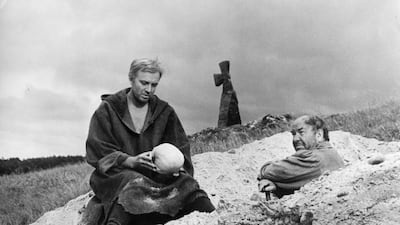“Think back, what is your first memory of exposure to Shakespeare?” Margaret Litvin, associate professor of Arabic and comparative literature at Boston University, asks her audience on Monday night. From catchy phrases on mugs and fridge magnets to traditional “doublet and hose” offerings of William Shakespeare’s works on television, film and the stage, few of us, Litvin points out, first encounter his published works on the page.
The myriad ways in which Shakespeare’s plays filter into our individual and collective consciousness are one reason why Shakespeare is still performed around the world exactly 400 years after his death. But, as she explains in her lecture at New York University Abu Dhabi, Litvin is more interested in the power of what she calls the “global kaleidoscope”; that is to say, how a distinctive Arab tradition has sprung up in response to particular adaptations of Shakespeare.
One good example of this phenonmenon is an early Arabic version of Hamlet by Tanyus 'Abdu, which was performed in Cairo in 1901, and has been much derided ever since. Litvin discovered, and not by intensive research but by merely asking, that Abdu was not translating Shakespeare's Hamlet at all. Contrary to what Abdu himself claims on the play's frontispiece, he had written up the French novelist Alexandre Dumas's adaptation of Hamlet, originally written for the Comédie-Française, complete with a happy ending.
“No one has bothered [to find out],” Litvin tells me before her lecture, “because they were assuming it was a bad translation and a direct translation, and that just made it more bad. And who cares?
“They never thought to ask, ‘Well, what exactly was this guy translating and did he do a good job of it or not?’ I actually think he did a pretty fine job.”
Why should the roundabout pathways and zig-zagging deviations by which “Shakespeare” finds Arab dramatists and audiences matter? For one, it tells us that Arab writers are just like artists everywhere and take their inspiration from a wide number of sources, languages and cultures.
The power to inspire that some adaptations have had over Arab dramatists more than others also informs the context in which the plays have been written and performed. As Litvin says: “I’m interested in international and interlingual cultural flows. The way that stuff moves and the idea that the stuff doesn’t move by itself; it moves because somebody wants it. It moves because it feeds a hunger or scratches an itch.”
The wild popularity in Egypt of Grigori Kozintsev's Hamlet, a 1964 film adaptation, based on a translation by Boris Pasternak with a score by Dmitri Shostakovich, is a revealing case in point. Every member of the film's cast and crew had suffered under the regime of Joseph Stalin and this darkness shows.
When Egyptian president Gamal Abdel Nasser's dream of Pan-Arabism failed after a crushing defeat in the 1967 war, it was Hamlet the frustrated revolutionary, played in the mode of Kozintsev's Hamlet, that Arab dramatists responded to.
“Why did that particular Soviet film resonate so well in Cairo and any number of other films didn’t?” Litvin asks. “Because people saw something in it that people wanted and needed and could use and let them say something that they wanted to say.”
Why Hamlet? A new book, Four Arab Hamlet Plays, co-edited by Litvin, brings Arab adaptations to English audiences for the first time as proof that Arab dramatists have made Hamlet their own, far more than Shakespeare's.
The Arab Hamlet is not Shakespeare’s indecisive “To be or not to be” anti-hero, Litvin explains, but rather a frustrated revolutionary, a powerless alcoholic, even a religious extremist conflating moral and political corruption.
"For nearly 40 years leading up to the 2011 Arab uprisings, and for at least three of the five years since 2011, a great number of Arab intellectuals have seen themselves in Hamlet: their times "out of joint", their hopes frustrated by a corrupt and selfish older generation, their elections stolen, their aspirations offered lip service but no satisfaction," she said at the book's launch last month.
She continued: “The central element that makes all these plays work is wit. They are witty. They are even funny, hilariously if bitterly funny. Some include music and dancing, but all of them offer insightful interpretations of Shakespeare’s text even as they brilliantly skewer the speech patterns and hypocrisies of contemporary Arab regimes and the self-regarding intellectuals who enable them.”
Litvin is hopeful that Four Arab Hamlet Plays will bring Arab Shakespeare to a new, non-academic audience, and this last part is key. She is one of many academics, she says, trying to "put modern Arabic literature back into the conversation about world literature".
Beyond academic discourses on orientalism and post-colonialism, Litvin’s end-goal is more simple. “I’m trying to reinstate Arab theatre people, in this case, or Arab writers in some of my other work, as agents who operate in a complex, normal world.
“Agents who know Borges and Lorca better than I do. Who know Beckett, and Shakespeare and Molière, and are conscious of negotiating multiple sources of inspiration, conscious of having to choose. And do choose which way to go in it.”
• Four Arab Hamlet Plays, edited by Marvin Carlson and Margaret Litvin, is published by Martin E Segal Theatre Center Publications, priced Dh90.
Clare Dight is editor of The Review.

